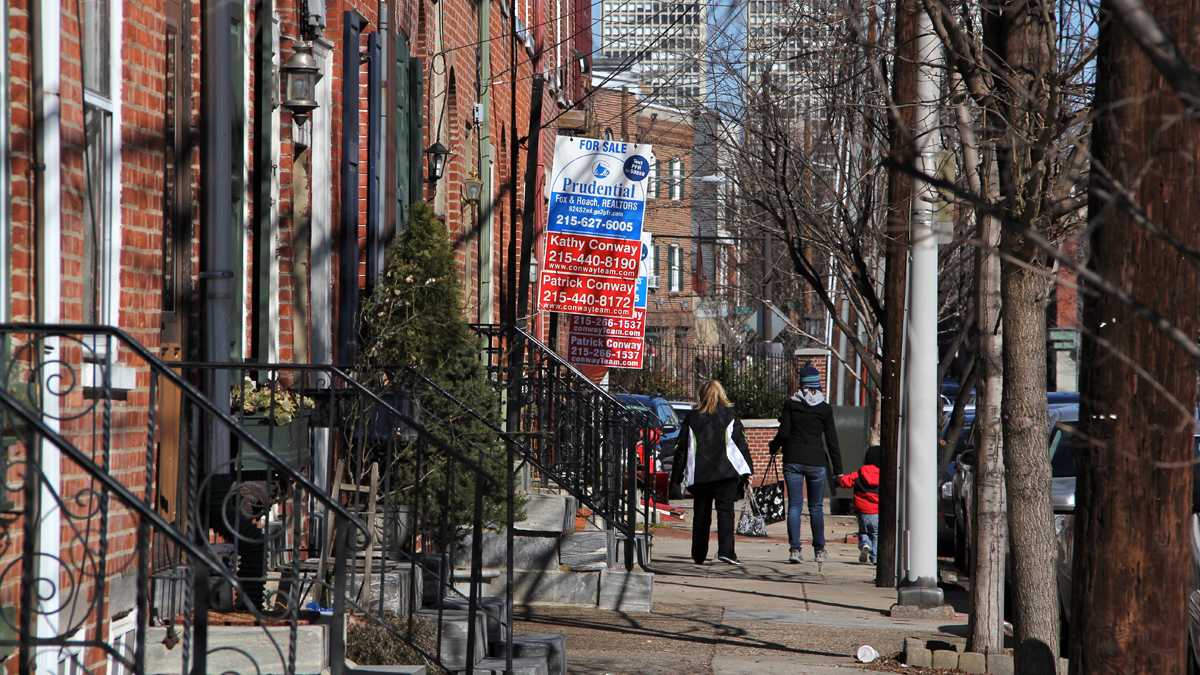Trump reverses late Obama effort to help first-time home buyers

Homes are advertised for sale on Second Street in Philadelphia's Queen Village neighborhood. (Emma Lee for NewsWorks
Within his first hour in office, President Donald Trump reversed an effort by the Obama administration that would have saved first-time homebuyers in the Philadelphia area hundreds of dollars a year on mortgage insurance and helped them stop renting.
The Federal Housing Administration’s default insurance program works like this: Let’s say you’re buying a house for the first time and you don’t have enough for a 20 percent down payment. With default insurance from the FHA, lenders are willing to give you a bigger loan so you’ll only have to put down say, 5 percent. That also means every month, you’ll have to shell out for the annual insurance premium on top of your mortgage payment (and setting aside money for property taxes).
The program is popular with people who have lower credit scores or not a lot of savings.
“These tend to be lower income households, younger households, households that are just starting families,” said Benjamin Keys, a professor of real estate at the University of Pennsylvania’s Wharton School.
Starting Friday, FHA insurance premiums were supposed to get cheaper because of action taken in the final days of the Obama administration to offset the impact of rising mortgage rates. In Philadelphia, Keys said the average homebuyer would have saved $540 a year.
But the Trump administration has suspended that cut indefinitely.
“FHA is committed to ensuring its mortgage insurance programs remains viable and effective in the long term for all parties involved, especially our taxpayers,” general deputy assistant for secretary for housing Genger Charles wrote in a letter announcing the reversal last Friday. “As such, more analysis and research are deemed necessary to assess future adjustments while also considering potential market conditions in an ever-changing global economy that could impact our efforts.”
Republican lawmakers — including Pennsylvania U.S. Senator Pat Toomey — have worried that lower premiums will mean the FHA won’t have enough money to cover loan defaults if the housing market goes sour again. The agency received a $1.7 billion taxpayer-funded bailout in 2013 when it incurred a flood of losses on loans it insured during the subprime mortgage crisis.
Forrest Huffman, a real estate professor at Temple University’s Fox School of Business, said he doesn’t expect this reversal to have a major impact on homebuyers.
“Taking out FHA default insurance would not be an issue for most of the borrowing public,” he said.
But in cities like Philadelphia where prices are rising, Keys said there is a benefit to helping more people buy homes.
“We’d see less pressure on rental markets as apartment rents have gone through the roof,” he said. “And I think we’d see opportunities for some more low-income and younger families to begin to build wealth through home ownership.”
Keys said concerns about the FHA’s insurance fund becoming underfunded and requiring another bailout “don’t seem to fit with the facts on the ground.”
“Today, you have a very healthy and sustainable mortgage market,” he said.
So far, those in the local real estate business are not seeing any ripple effects on the ground as a result of the Trump administration’s recent move.
“As of right now, we’re trying to make sure that our buyers who were underneath the Obama change are still ok to purchase the property under the Trump change,” said Philadelphia-based realtor Heather Petrone-Shook.
WHYY is your source for fact-based, in-depth journalism and information. As a nonprofit organization, we rely on financial support from readers like you. Please give today.




